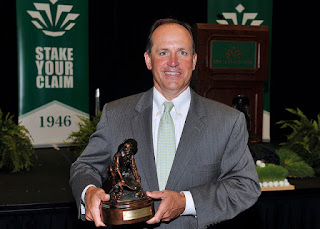By Meg Whalen
To the adult eye, it
might be a giant pumpkin or the crown of the “Queen City,” or — its original
design inspiration — an apple. To the kindergartners at Chantilly Montessori
School, the new structure on the playground suggests limitless possibility.
“We love it!” said blond-headed
Ruby.
“We can pretend it’s like
a school or a house,” added her friend, Vanessa.
 |
| Ashley Girth leads UNC Charlotte's AIAS chapter. |
“It’s an igloo!” a boy
called out.
“My friends call it the
drum station,” countered another. “They drum on the seats.”
“It’s so rewarding to see
the little kids using it,” said fourth-year architecture student Ashley Girth,
watching the children play on a bright April afternoon. A parade of feet stomps
along the sturdy wooden and concrete benches that encircle the structure’s interior.
Black patent leather shoes, Batman sneakers, floral fabric flats and pink Disney
princess boots suddenly leap off and run across the playground to a wooden deck
platform with seats, railings and planting boxes.
Both the play structure
and the “outdoor classroom” in the Chantilly Montessori playground were
designed and built by UNC Charlotte students and faculty. They are the most
recent projects completed by Freedom By Design, a program of the University’s
chapter of the American Institute of Architects Students (AIAS). Girth is the
program’s current president.
‘Radically Impact’
As the AIAS community service
program, Freedom By Design encourages architecture students to use their skills
to “radically impact the lives of people in their communities,” said the AIAS
website. The UNC Charlotte School of Architecture started a Freedom By Design
program in 2007 under the mentorship of architecture faculty John Nelson, Greg
Snyder and David Thaddeus.
 |
| The playground is popular with students. |
The first projects, said
Nelson, were about “designing something that restores freedom to movement.” The
students replaced stairs with ramps, widened doorways, rebuilt porches —
projects that helped older people regain mobility within their homes. Nelson said
the projects are not only about community engagement but an educational
opportunity.
“Most architecture
students don’t have construction experience. If we are going to design
buildings, we need to know how to put them together.” While architecture
faculty consistently provide guidance and resources, the program is “student
initiated and student led: We tell them ‘we are not going to do it for you,’”
Nelson said.
The relationship with
Chantilly Montessori began more three years ago with the design and
construction of the outdoor learning space.
“It’s been amazing to
work with the students at UNC Charlotte because of their enthusiasm and their
willingness to embrace the thoughts, concerns and ideas that we had at
Chantilly,” said Heather Simpson, a teacher at the school who oversaw the first
project. “The design of the outdoor learning space kept morphing and morphing
as we (teachers) gave input.”
The space is used not
only for playtime but for science lessons, especially environmental science
activities. “It’s been used by at least 11 classrooms,” Simpson said.
Nature’s Design
 |
| The playground doubles as an outside classroom. |
After completing the
outdoor classroom in the spring of 2013, UNC Charlotte continued its
relationship with the school by beginning the design of the playhouse. After
two planning meetings, the Freedom By Design students chose a concept based on an
apple — not only for its metaphorical association with education but because of
the inherent structural stability of nature’s design. At one planning meeting,
students grabbed apples and carving tools and began to “interrogate” the form.
“We wanted to explore new
construction methods to achieve the apple form and create opportunities that
allowed us to expand our architecture and design/build experiences,” said
Girth. Months later, people passing through Storrs architecture building could
see huge wooden arcs lying on the floor and propped against walls — glued,
laminated timber “ribs,” bent to form the apple-shaped structure.
On Jan. 17, Girth, Nelson,
architecture professor Greg Snyder and more than 20 students who included
Snyder’s Design Build 1 seminar class gathered at Chantilly to assemble the
main structure of the playhouse. As a team, they worked together to put each
rib up one by one. As the first rib went up, Girth couldn’t watch.
“I was so afraid it
wouldn’t come together. But once they were all up, I was like — wow! That’s
what we designed. It was pretty neat.”
The final touches were completed
in March. In keeping with the Freedom By Design mission, the project was done
at no cost to the school. Funding came from the School of Architecture and the
Charlotte chapter of the American Institute of Architects, with in-kind
donations from Lowe’s, Home Depot and Faulk Brothers Hardware.
“As a leader through the
design and construction phases of the project, I can’t believe how many great
people I have gotten to work with and how much I have been encouraged to
continue doing projects like this in the future,” Girth mused, viewing the
children gallop in and out of the apple/igloo/crown/drum
station/fort/playhouse. “There were definitely some difficult moments, but
finally seeing it finished — every bit of work has been worth it.”
Meg
Freeman Whalen is director of communications and external relations for the
College of Arts + Architecture.





